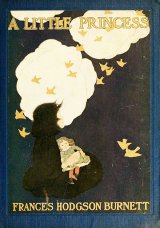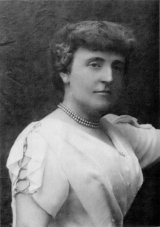A Little Princess Page #19
A Little Princess is a children's novel by Frances Hodgson Burnett, first published as a book in 1905.
"You--you are not to go in there," she said. "Not go in?" exclaimed Sara, and she fell back a pace. "That is not your room now," Miss Amelia answered, reddening a little. Somehow, all at once, Sara understood. She realized that this was the beginning of the change Miss Minchin had spoken of. "Where is my room?" she asked, hoping very much that her voice did not shake. "You are to sleep in the attic next to Becky." Sara knew where it was. Becky had told her about it. She turned, and mounted up two flights of stairs. The last one was narrow, and covered with shabby strips of old carpet. She felt as if she were walking away and leaving far behind her the world in which that other child, who no longer seemed herself, had lived. This child, in her short, tight old frock, climbing the stairs to the attic, was quite a different creature. When she reached the attic door and opened it, her heart gave a dreary little thump. Then she shut the door and stood against it and looked about her. Yes, this was another world. The room had a slanting roof and was whitewashed. The whitewash was dingy and had fallen off in places. There was a rusty grate, an old iron bedstead, and a hard bed covered with a faded coverlet. Some pieces of furniture too much worn to be used downstairs had been sent up. Under the skylight in the roof, which showed nothing but an oblong piece of dull gray sky, there stood an old battered red footstool. Sara went to it and sat down. She seldom cried. She did not cry now. She laid Emily across her knees and put her face down upon her and her arms around her, and sat there, her little black head resting on the black draperies, not saying one word, not making one sound. And as she sat in this silence there came a low tap at the door--such a low, humble one that she did not at first hear it, and, indeed, was not roused until the door was timidly pushed open and a poor tear-smeared face appeared peeping round it. It was Becky's face, and Becky had been crying furtively for hours and rubbing her eyes with her kitchen apron until she looked strange indeed. "Oh, miss," she said under her breath. "Might I--would you allow me--jest to come in?" Sara lifted her head and looked at her. She tried to begin a smile, and somehow she could not. Suddenly--and it was all through the loving mournfulness of Becky's streaming eyes--her face looked more like a child's not so much too old for her years. She held out her hand and gave a little sob. "Oh, Becky," she said. "I told you we were just the same--only two little girls--just two little girls. You see how true it is. There's no difference now. I'm not a princess anymore." Becky ran to her and caught her hand, and hugged it to her breast, kneeling beside her and sobbing with love and pain. "Yes, miss, you are," she cried, and her words were all broken. "Whats'ever 'appens to you--whats'ever--you'd be a princess all the same--an' nothin' couldn't make you nothin' different." 8 In the Attic The first night she spent in her attic was a thing Sara never forgot. During its passing she lived through a wild, unchildlike woe of which she never spoke to anyone about her. There was no one who would have understood. It was, indeed, well for her that as she lay awake in the darkness her mind was forcibly distracted, now and then, by the strangeness of her surroundings. It was, perhaps, well for her that she was reminded by her small body of material things. If this had not been so, the anguish of her young mind might have been too great for a child to bear. But, really, while the night was passing she scarcely knew that she had a body at all or remembered any other thing than one. "My papa is dead!" she kept whispering to herself. "My papa is dead!" It was not until long afterward that she realized that her bed had been so hard that she turned over and over in it to find a place to rest, that the darkness seemed more intense than any she had ever known, and that the wind howled over the roof among the chimneys like something which wailed aloud. Then there was something worse. This was certain scufflings and scratchings and squeakings in the walls and behind the skirting boards. She knew what they meant, because Becky had described them. They meant rats and mice who were either fighting with each other or playing together. Once or twice she even heard sharp-toed feet scurrying across the floor, and she remembered in those after days, when she recalled things, that when first she heard them she started up in bed and sat trembling, and when she lay down again covered her head with the bedclothes. The change in her life did not come about gradually, but was made all at once. "She must begin as she is to go on," Miss Minchin said to Miss Amelia. "She must be taught at once what she is to expect." Mariette had left the house the next morning. The glimpse Sara caught of her sitting room, as she passed its open door, showed her that everything had been changed. Her ornaments and luxuries had been removed, and a bed had been placed in a corner to transform it into a new pupil's bedroom. When she went down to breakfast she saw that her seat at Miss Minchin's side was occupied by Lavinia, and Miss Minchin spoke to her coldly. "You will begin your new duties, Sara," she said, "by taking your seat with the younger children at a smaller table. You must keep them quiet, and see that they behave well and do not waste their food. You ought to have been down earlier. Lottie has already upset her tea." That was the beginning, and from day to day the duties given to her were added to. She taught the younger children French and heard their other lessons, and these were the least of her labors. It was found that she could be made use of in numberless directions. She could be sent on errands at any time and in all weathers. She could be told to do things other people neglected. The cook and the housemaids took their tone from Miss Minchin, and rather enjoyed ordering about the "young one" who had been made so much fuss over for so long. They were not servants of the best class, and had neither good manners nor good tempers, and it was frequently convenient to have at hand someone on whom blame could be laid. During the first month or two, Sara thought that her willingness to do things as well as she could, and her silence under reproof, might soften those who drove her so hard. In her proud little heart she wanted them to see that she was trying to earn her living and not accepting charity. But the time came when she saw that no one was softened at all; and the more willing she was to do as she was told, the more domineering and exacting careless housemaids became, and the more ready a scolding cook was to blame her. If she had been older, Miss Minchin would have given her the bigger girls to teach and saved money by dismissing an instructress; but while she remained and looked like a child, she could be made more useful as a sort of little superior errand girl and maid of all work. An ordinary errand boy would not have been so clever and reliable. Sara could be trusted with difficult commissions and complicated messages. She could even go and pay bills, and she combined with this the ability to dust a room well and to set things in order.
Translation
Translate and read this book in other languages:
Select another language:
- - Select -
- 简体中文 (Chinese - Simplified)
- 繁體中文 (Chinese - Traditional)
- Español (Spanish)
- Esperanto (Esperanto)
- 日本語 (Japanese)
- Português (Portuguese)
- Deutsch (German)
- العربية (Arabic)
- Français (French)
- Русский (Russian)
- ಕನ್ನಡ (Kannada)
- 한국어 (Korean)
- עברית (Hebrew)
- Gaeilge (Irish)
- Українська (Ukrainian)
- اردو (Urdu)
- Magyar (Hungarian)
- मानक हिन्दी (Hindi)
- Indonesia (Indonesian)
- Italiano (Italian)
- தமிழ் (Tamil)
- Türkçe (Turkish)
- తెలుగు (Telugu)
- ภาษาไทย (Thai)
- Tiếng Việt (Vietnamese)
- Čeština (Czech)
- Polski (Polish)
- Bahasa Indonesia (Indonesian)
- Românește (Romanian)
- Nederlands (Dutch)
- Ελληνικά (Greek)
- Latinum (Latin)
- Svenska (Swedish)
- Dansk (Danish)
- Suomi (Finnish)
- فارسی (Persian)
- ייִדיש (Yiddish)
- հայերեն (Armenian)
- Norsk (Norwegian)
- English (English)
Citation
Use the citation below to add this book to your bibliography:
Style:MLAChicagoAPA
"A Little Princess Books." Literature.com. STANDS4 LLC, 2025. Web. 11 Jan. 2025. <https://www.literature.com/book/a_little_princess_31>.




Discuss this A Little Princess book with the community:
Report Comment
We're doing our best to make sure our content is useful, accurate and safe.
If by any chance you spot an inappropriate comment while navigating through our website please use this form to let us know, and we'll take care of it shortly.
Attachment
You need to be logged in to favorite.
Log In